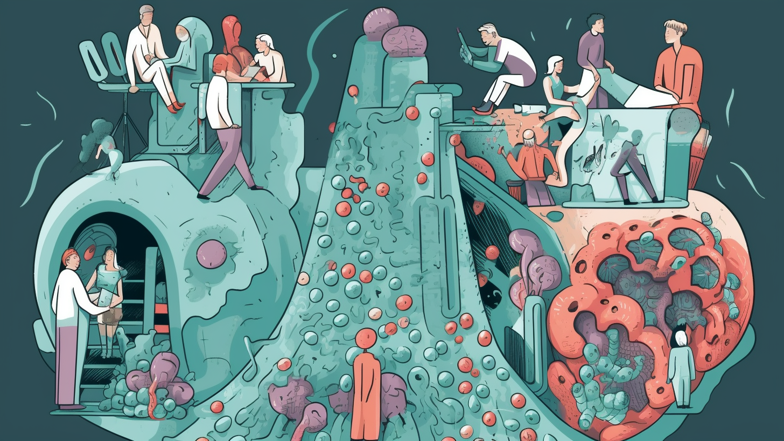
Immunotherapy is a type of cancer treatment that uses a patient's immune system to fight cancer. This new approach aims to treat cancer by boosting the body's natural defense mechanisms, allowing it to recognize cancer cells as foreign invaders and eliminate them. Unlike traditional cancer treatments such as chemotherapy, radiation therapy, and surgery, immunotherapy has the potential to provide a more targeted, specific approach that can be customized according to a patient's unique biological characteristics.
Despite its potential, immunotherapy does not work for everyone, and a significant proportion of patients do not respond to treatment. Biomarkers have emerged as a critical tool to identify patients who are most likely to benefit from immunotherapy, and predict their likelihood of response. Biomarkers are measurable biological characteristics that can be used to identify specific diseases, monitor the progression of illness, and predict treatment outcomes.
The use of biomarkers in cancer treatment is not a new concept; it has been used for decades. However, with recent developments in technology and the growing understanding of the biological mechanisms underlying cancer, biomarkers are increasingly becoming an essential tool in personalized medicine.
Personalized medicine is an approach to healthcare that seeks to tailor medical treatments to the individual patient. The use of biomarkers in personalized medicine is particularly important in cancer treatment, as it allows medical professionals to identify patients who are more likely to respond to immunotherapy and provides them with the best possible treatment plan.
The first step in using biomarkers in cancer treatment is to identify the genes and proteins that are essential in the activation of the immune system. By studying the immune system, researchers have discovered that numerous immune checkpoint proteins play a critical role in the prevention of unwanted autoimmunity and the activation of tumor-specific immunity.
These proteins essentially function as brakes on the immune system, preventing it from overreacting and attacking healthy tissue. Some tumors have learned how to hijack these checkpoints to evade detection by the immune system, leading to the survival and proliferation of cancerous cells.
Immunotherapy aims to disrupt these checkpoints in order to unleash the body's immune system against the cancer cells. Biomarkers can help identify which patients are most likely to respond to checkpoint inhibitors, the class of immunotherapy drugs that target immune checkpoints.
One biomarker that has shown particular promise in predicting responses to checkpoint inhibitors is PD-L1 expression. PD-L1 is a protein that is found on the surface of some cancer cells, and it binds to a protein called PD-1 on the surface of immune cells, preventing them from attacking the cancer cells.
Checkpoint inhibitors such as pembrolizumab and nivolumab target PD-1, effectively blocking the interaction between PD-L1 and PD-1. However, not all patients with PD-L1-positive tumors respond to PD-1 inhibitors, and some patients with PD-L1-negative tumors do respond. Therefore, additional biomarkers are needed to improve the accuracy of response prediction.
Other potential biomarkers include tumor mutational burden (TMB), microsatellite instability (MSI), and the presence of neoantigens. TMB is a measure of the number of genetic mutations present in a tumor, and it has been associated with improved responses to immunotherapy. MSI is a marker of DNA damage repair deficits, and it has also been associated with better outcomes with checkpoint inhibitors.
The presence of neoantigens, which are proteins on the surface of tumor cells that the immune system recognizes as foreign, can also be used to predict responses to immunotherapy. By sequencing the DNA of a patient's tumor, researchers can identify the specific neoantigens present in the tumor and predict whether they will elicit an immune response.
By combining multiple biomarkers, researchers are hoping to improve the accuracy of response prediction and identify patients who are most likely to benefit from immunotherapy. In addition to predicting responses, biomarkers can also be used to monitor the effectiveness of treatment and detect early signs of relapse.
Despite the potential of biomarkers in revolutionizing cancer treatment, there are still numerous challenges that need to be overcome. For example, different biomarkers may be required for different types of cancer or different stages of the disease. Furthermore, biomarkers may be affected by factors such as the patient's age, sex, and overall health.
In conclusion, the use of biomarkers in cancer treatment provides immense hope for improving cancer treatment outcomes. By identifying patients who are most likely to benefit from immunotherapy, medical professionals can provide personalized treatments that offer better chances of success and fewer side effects. While challenges remain, the potential of biomarkers in the fight against cancer cannot be ignored.
Comments
Post a Comment